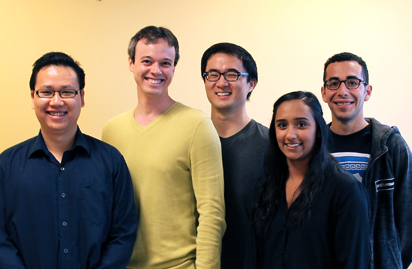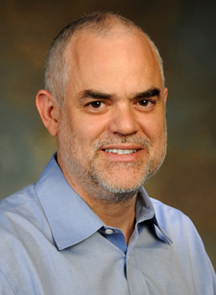In Brief
Romesberg Research Voted 'People’s Choice' for 2014 Science Breakthrough
Research from the lab of Floyd Romesberg, associate professor at The Scripps Research Institute (TSRI), has been voted the People’s Choice for the Breakthrough of the Year in an online competition sponsored by the journal Science.
In the paper, published last May in the journal Nature, Romesberg and his colleagues added two new DNA “letters,” or bases—X bound to Y—to a live bacterium’s genetic material, enlarging the DNA “language” beyond the G-C and A-T pairs found in nature. The work demonstrates that additional solutions to storing genetic information are possible and promises potential applications from new medicines to new kinds of nanotechnology. (See also the News&Views article on the research.)
The results were announced after a vote among five finalists. For more information, see "Breakthrough of the Year People's Choice: And the winner is..."

The team who worked on the breakthrough paper included (left to right) Tingjian Chen, Denis Malyshev, Yorke Zhang, Kirandeep Dhami and E. Aaron Ward Feldman. (Photo by Cindy Bauer.)
Luke Wiseman Awarded Amyloidosis Foundation Grant
TSRI Assistant Professor Luke Wiseman has received a Junior Research Grant from the Amyloidosis Foundation (AF), a nonprofit organization dedicated to increasing awareness of and support for the diagnosis and treatment amyloid diseases, a group of diseases caused by a buildup of misfolded proteins.
One of three AF awardees, Wiseman’s $50,000 grant supports his team’s research in developing new strategies to reduce lethal accumulations of unstable proteins by enhancing the natural, protective pathways that regulate the levels of unstable proteins in the blood. The team’s goal is to create a single therapeutic approach to treat the many different systemic amyloid diseases.
Additional information on Wiseman’s research can be found on his faculty webpage and the News&Views story “New Studies Bring Scientists Closer to Combating Dangerous Unstable Proteins."
Ryan Stowe Named Mirzayan Science and Technology Policy Fellow
Ryan Stowe, a graduate student on the Scripps Florida campus, has been named a Christine Mirzayan Science and Technology Policy Fellow at the National Academies.
“I am extremely excited to join the National Academy of Sciences early next year as a Christine Mirzayan Fellow,” Stowe said. “I intend to pursue a career in science education that should synergize with both the scientific training at Scripps Florida and the policy exposure afforded by the Mirzayan Fellowship.”
In the 12-week fellowship, he will work with the director of the Board on Science Education on projects ranging from K-12 teacher training to the development of informal learning experiences.
The Christine Mirzayan Science & Technology Policy Graduate Fellowship Program, now in its 17th year, is a hands-on program that provides early-career individuals with the opportunity to spend time at the National Academies in Washington, D.C., learning about science and technology policy and the role that scientists and engineers play in advising the nation.
Brandon Rosen Wins Top Graduate Student Symposium Prize
Brandon Rosen received the top outstanding oral presentation award at the recent TSRI Graduate Program Symposium, an annual gathering at Lake Arrowhead held by the TSRI Graduate Program office. Nicole Schirle and Jessica Sheu-Gruttadauria shared second place for their presentations.
Rosen, a fourth-year student in the Baran lab, whose top honor came with $3,000, presented "Total Synthesis of Dixiamycin B by Electrochemical Oxidation." In it, he described his research on the development of a new electrochemical method to synthesize an architecturally complex natural product, a technique which could ultimately be generally applied in drug discovery.
Schirle and Sheu-Gruttadauria each received $1,500. Schirle’s talk, “Structural Basis for microRNA Target Recognition," outlined her research on the protein Argonaute, which focuses on uncovering the interactions between the protein and guide microRNA complex with a target messenger RNA to provide a detailed mechanism for microRNA targeting.
Sheu-Gruttadauria’s presentation, “Recruitment of TNRC6 to miRNA targets via three tryptophan-binding sites on Argonaute,” described her research on the microRNA –induced silencing pathway, focusing on the structural elucidation of the interface between two central components, Argonaute and TNRC6.
Career Training: Effective Career Planning
A seven-week course, “Effective Career Planning for PhDs,” will be offered for Scripps California postdoctoral fellows and graduate students, Wednesdays, January 7 to February 18, 3 to 5 PM in the Graduate Office, Hazen Theory Building.
Conducted by Ryan Wheeler, director of TSRI Career and Postdoctoral Services, and Jean Branan, program coordinator, the course is designed to equip participants with the skills, resources and self-assessment required for informed career choices in academia and beyond. The training emphasizes skills sets such as networking, self-evaluation, a professional online presence, goal setting and the Individual Development Plan, a free online career planning and self-assessment tool.
To sign up for the course, postdoctoral fellows can email registration requests to cpso@scripps.edu; graduate students register through the TSRI registration system.
New CA Group to Tackle Overcoming Shyness
Improving self-confidence and learning to take healthy interpersonal risks are the goals of a new Scripps California monthly discussion group, “Overcoming Shyness,” that begins with an orientation meeting Tuesday, January 20, at noon in the Beckman building, fifth floor north conference room.
Daphne Lurie, director of TSRI’s Counseling and Psychological Services office, and staff therapist Diana Bull will facilitate the year-long group, which will draw from The Shyness and Social Anxiety Workbook, by Martin Antony and Richard Swinson.
“Group members will be asked to read one chapter and complete that chapter’s exercises each month. We’ll discuss what we’ve learned during our meetings,” Lurie explains. Chapter topics include “Why Do You Have These Fears?”, “Changing Your Anxious Thoughts and Expectations” and “Communicating More Effectively.”
Participants can purchase new or used paperback copies of the workbook, as well as Kindle editions, on Amazon.com. Prices range from $9 to $16.
Once filled, the group will be closed to new members. To register for the orientation meeting or for further information, contact Holly Wheeler, counseling services administrative assistant, at hollyw@scripps.edu or x4-7297.
Additional information on other resources and events are available on the counseling services website.
CA Blood Donors for Research Offered Cash Compensation
TSRI’s Normal Blood Donor Service (NBDS) seeks new donors to meet an urgent need for normal human blood products used by institute investigators on the California campus. Donors are immediately compensated $25 to $100 for a single blood draw.
The NBDS donor pool is open to all healthy individuals in the TSRI community who are readily available during working hours. Potential donors must meet the following criteria:
- Age: 18 to 65 years.
- Weight: at least 110 pounds (50 kg).
- Blood pressure: between 90 to 180 mm Hg systolic and 50 to 100 mm Hg diastolic.
- No major surgery within the past six months.
- Adequate hemoglobin test scores.
- Negative screening for HIV and Hepatitis B and C, upon entry to the program and every subsequent year.
- No daily use of aspirin or anti-inflammatory medication.
Further details, including applications to become a paid donor, are available at the NBDS website. NBDS Coordinator Priscilla Crisler can be reached at (858) 784-5418; by fax, (858) 652-5556; or email, corelab@scripps.edu.
Send comments to: mikaono[at]scripps.edu














